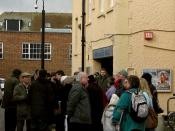"The existence of pressure groups makes Government more democratic; the activities of pressure groups also make democratically elected Governments more effective."
People to protect or advance a shared interest, form interest or pressure groups. Political parties and groups can be large campaigning bodies, but unlike political parties who have many policy issues, groups are sectional and wish to influence government only on certain issues and policies. The variety of modern pressure groups reflects the diversity of the interests of society. There are several types of pressure group such as sectional or interest groups; these are mostly motivated, by group's members and the member's economic interests. Cause pressure groups promote an idea that is not directly related to the personal interests of its members. Peak associations are another type of interest group, which take the form of umbrella organizations and represent broad bands of similar groups. Fire brigade groups form a reaction to a specific problem and are forced to disband if and only when a problem has been solved.
These are often single-issue groups. Non-political groups are known as episodic groups. These groups will only take a political stance if its interests are affected It is the aim of this essay to explore the theoretical perspectives regarding pressure groups and to assess the benefits and shortcomings of pressure groups in order to find out if pressure groups did not exist then would governments have to invent them.
There are several theoretical perspectives regarding pressure or interest groups. The pluralist approach has a descriptive nature and tells us how things are and it is a normative approach in the way that it believes this is in a general manner a good way for things to be. British commentators first recognized the importance of pressure group activity in the 1950s. Following an...


